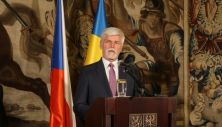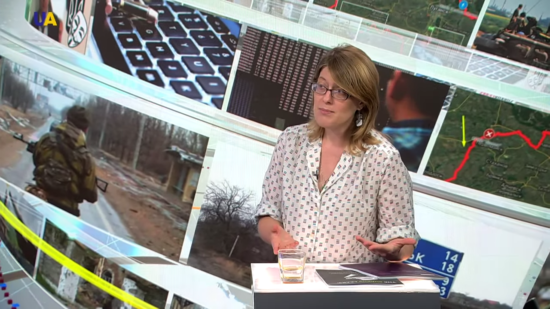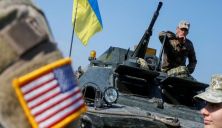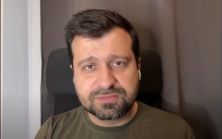Hello and welcome, you are watching Head to Head. I am Kari Odermann with UATV. Today we are talking about a report on how Russia pursues a hybrid war to destabilize Ukraine. It is the first major study of the Surkov Leaks, three tranches of hacked emails belonging to top Putin advisor Vladislav Surkov and figures around him, which were obtained by Ukrainian cyberactivists in 2016-2017.
The report demonstrates how the Kremlin is re-inventing Soviet-era tactics to exert power and destabilize neighboring countries. And it provides a detailed insiders’ view of Russia’s strategy and tactics for destabilizing Ukraine.
Alya Shandra, editor-in-chief of “Euromaidan Press” and one of the authors of the report, joined us in the studio to answer these questions.
Before I ask the first question, we’ve got some footage we’d like to show.
It looks like Russia is using the same tactics, but they’ve updated them a little bit too modern times. Using e-mails, cyber and hybrid warfare — let’s talk a little bit about this.
Indeed, many researchers of Russian hybrid war have noted that, basically, it’s an updated version of Soviet-time tactics of “active measures.” And yes, a modified version of these “active measures” is being used in Ukraine and countries of the West, but to different extents. Because Russia can penetrate Ukraine much easier than the countries of the West, its arsenal of tactics is much larger.
So, whereas, in the West, we have seen a lot of attention paid to disinformation and propaganda, which is, of course, a major component of Russia’s hybrid war, here, in Ukraine, it has endlessly more opportunities. And the Surkov Leaks are valuable because they give us an insider’s look. They give us evidence-based proof of what Russia is doing.
How do we know the leaks were authentic?
Well, first of all, we need to look at the volume of leaks. It’s impossible to make up so many e-mails, it’s impossible to make up so many photo and video reports that you cannot find anywhere else. The sheer bulk of the e-mails lends credibility to this hack being authentic because there’s so much analytical work from different analytical centers. But secondly, we can also look at the headers, the digital headers of the e-mails, which also, according to the specialists, appear to be authentic.
Because of the bulk of them, and they were from 2016-2017.
No, the hacks were from 2016-2017, but the leaks, unfortunately, ended in 2015, so we only have this brief snapshot of what was happening in 2014 and 2015.
You said it was a brief snapshot. How much data are we talking about?
It’s around 4,000 e-mails.
And how were you able to go through these e-mails? What was the process for the report?
I uploaded them into the program and read through them all, one by one.
It shows that same amount of dedication too. What is one of the e-mails that stick out most in your mind?
For me, it’s difficult to select them, because what was striking to me was the sheer amount of effort that the Kremlin is putting into analyzing Ukraine. It was this sheer bulk of analytical briefs studying meticulously every nook and cranny of our political landscape, all the possibilities to intervene in our affairs that struck me the most.
But, if I was to speak of the most valuable e-mails for Ukrainian position, maybe, on the international scene, it would be, probably, those proving Russian intervention in the (so-called) Donetsk People’s Republic, and proving how Kremlin played a crucial role in setting up those puppet republics. These e-mails are actually in this report and are used as proof of Russia’s control over the republics in international processes, and also in political discussions. So, I would say that this was probably the most important outcome – evidence-based proof of Russia’s control over the republics. Because, although for many analysts this is an open secret, still there are voices that say: “Where is your proof?” Well, the proof is nowhere, and this is, I think, a very good outcome of this report.
But there are many, many striking examples that are in there. One that comes to mind, particularly, is the way that the Kremlin disseminated its propaganda messages after MH-17 was shot down. It’s only one e-mail, but it gives very valuable insight into how the Kremlin works. There was a set of topics that the Kremlin sent out to a network of political influencers, and these influencers were divided into categories. So, it shows that the Kremlin kept track of their progress, and how influential they were. And maybe some were fired. And maybe others were recruited. And these influencers all inserted these messages where they could.
So, for instance, Russian diplomats got it into some Western media outlets, and then some influencers in Ukraine just got it into some blog, and some political influencers just said it in an interview. And by doing this, by, sort of, carpet bombing these messages from all sides, the Kremlin was able to form this alternative reality, basically.
There was a conspiracy theory that Ukraine shot down MH-17 because it was a Franz Ferdinand moment, like the start of World War I. There was artillery fire of this message from all sides. And, of course, this creates an illusion of reality, that it’s a legitimate message to have. So, that was one of them, a revealing e-mail, for me as well.
But another revealing e-mail, of course, is the way that Russia searched for narratives that could act as Trojan horses to advance its goals in Ukraine. For instance, one of the avenues it pursued was soft federalization of Ukraine, that is to urge Ukrainian regions to demand more autonomy from the central government for themselves. Of course, so that Kremlin can more easily influence Ukrainian political affairs. For instance, if these regions were given veto power over decisions such as entering NATO, then, of course, Kremlin will have endless opportunities to intervene in Ukraine’s course.
There is a lot of decentralization going on right now this is the cause why red flags are put next to your report.
Actually, it does because on the one hand decentralization gives opportunities for regions to use resources more efficiently. But on the other hand, in the state of war that Ukraine, de facto, is in right now, it gives also opportunities to intervene. So, if Ukraine were not in a state of war, the centralization would be, obviously, a very positive process. Here, it must be done very carefully and separate instances insist it must be done very carefully.
Have you made recommendations to Zelensky’s administration based on the interview report?
We try to contact state agencies to discuss this report with them, but we have not received it, they came to the presentation, but we have not been able to discuss this with them in detail.
You have a lot of in-depth research. You’ve worked with the Royal United Service Institute and a British MP. How does this cooperation look?
Well, Robert Silly is a British MP, who is also a researcher of Russian hybrid war. He worked as a journalist in Ukraine and also served in the military to understand how these military techniques work. And he is writing a Ph.D. about Russian hybrid war and, basically, I gave an interview to him when he was in Kyiv and our cooperation starts from there.
And the result as the support I was publishing with the British Institute, which is the world – they say – the world of independent things. Basically, I think that it was very fruitful cooperation, because Robert helped frame all of these processes, that are going on in Ukraine in a global context and compered them to the big-picture Russian hybrid war with different countries, which, I think, is very valuable for giving this situation in Ukraine international appeal.
So, basically returning to how the problem uses Trojan horse narratives. It is interesting with this, comparing to this federalizing of Ukraine, and how it was cloaked in very benevolent issues. Such as France’s giving to the Zaporizhzhia oblast, which has ecological problems. Everybody would want that, right? Of course, we want to solve our ecological problems. So, of course, under this narrative, the Kremlin is able to gather a lot of public traction, a lot of signatures and support for a special status for the Zaporizhzhia region. So, it acts this way in all of the regions and found these narratives, who could act as Trojan horses to advance its goals – and that’s one of the basics of reflexive control.
Was it social media, was it completely media-based or was it more a variety of social media?
It was not actually. Returning to our first question is: in the West, the Kremlin uses media disinformation. Here, it uses politicians, uses social moments, uses a lot of weapons in its hand. So, basically, when in the west it fabricates virtual reality in the media sphere, then here, it creates virtual reality on the ground. So, this movement is created on the ground. There were, for example, bright politicians, who made coalitions and support for the constitutional process.
There was an activists group that started supporting these politicians, there was a conference that was made by an activists group, sustaining it with posters and making the rallies, there was signature gathering. There were collected many of them and were delivered to the Verkhovna Rada. So, you see there is much more disinformation and fakes in the virtual reality and on the ground.
The reflexive control was also mentioned in the video. Did some of the people that participate in the propaganda, where they were aware of it or they were manipulated?
Well, I would like to divide Ukrainian collaborators with the Kremlin into two categories. One: they want to make money. They were being paid and they created all sorts of virtual activity. I think they understood that they were working for the Kremlin’s interest. But maybe they do not care. And other ones are ideological collaborators. They are the ones who willingly promote the idea of the Russian World and willingly help Russia to run the Ukrainian affairs. I think they are the most dangerous collaborators of the two because, of course, they wanted to achieve Russia’s goals in Ukraine.
Are they easy to differentiate?
Yes, of course. Because in Surkov’s email ideological collaborators are the ones generating the ideas, they want to organize the process and then there are just foot soldiers. So we have officers of Russia’s war and foot soldiers that just go to implement this and get paid for it. So, of course, I would say that these first collaborators are where the Ukrainian government and security services should pay very close attention to.
Because we see that, for instance, Odesa activist Anton Davidchenko was arrested after Euromaidan rallies in 2014 because he called for the disintegration of Ukraine. He was arrested but he was let out of house arrest. He escaped to Russia and from that moment we see all these plans that he implements together with Surkov’s office. We see all the damage that he causes and we see his unique value because he knows Ukraine from the inside. He has all these contacts.
He shares all this knowledge.
Yes, he offers this knowledge, basically, to destroy Ukraine, to destroy our statehood. So I cannot stress enough the importance of paying attention to these local collaborators and their actions. And I see that unfortunately, the Ukrainian government is not paying enough attention to this.
Because Alla Aleksandrovska, one of the most important collaborators in Surkov’s emails and Kharkiv Communist leaders that got her election campaign 2015 financed fully by the Kremlin. She perhaps will be let out from prison without serving a term. She was carrying a bribe that she was given to also as a part of the project to federalize Ukraine to push for more autonomy for the Kharkiv region. She was captured on the bribe but now she is not staying at the remand prison. Well, the process is ongoing. Basically, she has only night house arrest and she is free to move around as she wants and it’s all pointing to possible scenery that she will be released without serving any term at all. I think I would like to stress that it’s extremely important to identify local collaborators and do something about them.
Oh, your research certainly carries a lot of responsibility. I appreciate your being here.













